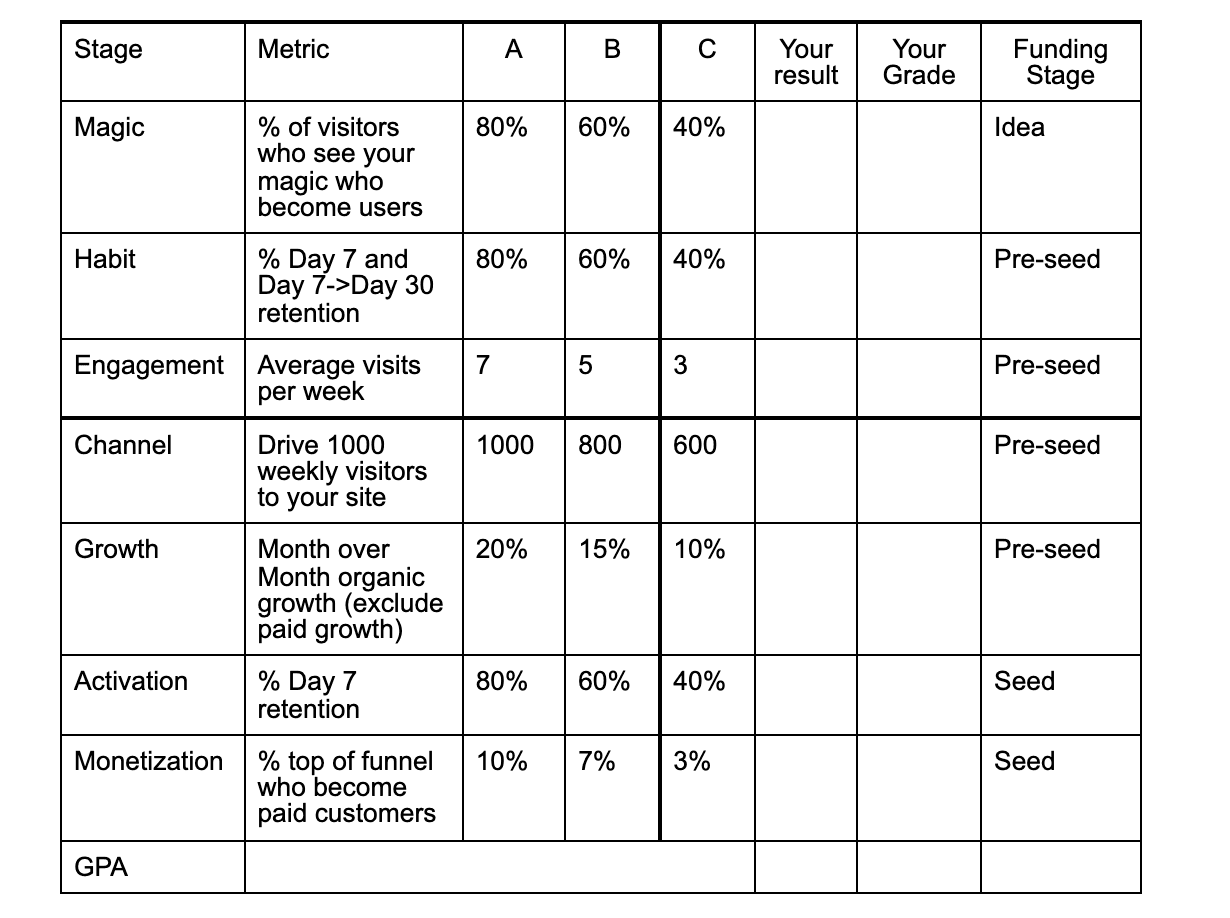Finding Product Market Fit
Curated from: docs.google.com
Ideas, facts & insights covering these topics:
9 ideas
·1.78K reads
20
Explore the World's Best Ideas
Join today and uncover 100+ curated journeys from 50+ topics. Unlock access to our mobile app with extensive features.
The PMF Report Card
John Danner of Dunce Capital created it as a way to track the progression of a startup from ideation to Series A. The stages are benchmarks for measuring product market fit:
- The magic refers to value proposition, the excitement people have when exposed to your approach to a clearly stated problem.
- At each stage, you need to get to at least a “C”.
68
486 reads
Stage 0: Idea Validation
The Milestone: Get a small number of users very excited by your product, to experience ‘the magic’ of the approach.
The magic is that moment when your user mentally puts together a big problem they have with the way your product solves it.
Typically, founders will get caught up in trying to make the first experience rock solid. That’s not important. It doesn’t have to be perfect to determine this, in fact it’s best if it isn’t because if you can get somebody excited about a bad product, you can later get them more excited about a good product.
66
217 reads
Stage 1: Magic
The Milestone: 80% of top of funnel users retain day 7 (i.e. come back at least one more time in the first week).
If your users aren’t retaining day 7, it’s likely that the smoke isn’t coming out of their ears, they never exclaimed ‘aha’ and all of the things people do when they realize they have been waiting for your product for a long time.
61
191 reads
Stage 2: Habit
The Milestone: 65% of users should retain d30.
The simple math of organic user acquisition is that you need very high day 7 and day7->day30 retention to grow. A high (but achievable) bar is 80% for each. When you combine those, you get an overall d30 retention of 65%.
61
207 reads
Stage 3: Your First Channel
The Milestone: Find a channel that can generate 1000 new users a week for you.
Before you waste your money, don’t do this with paid. Do the hard work to find out where they are and get the word out. That might be a set of working moms Facebook groups for an early childhood learning company, or an existing freelance community for a new freelance marketplace. There is a lot of creativity and experimentation in finding this channel
62
140 reads
Stage 4: Growth
The Milestone: You need to grow payers by 20% MoM organically.
That seems a bit insane until it doesn’t. You won’t maintain 20% MoM forever, but you should during seed or you don’t have PMF.
One of the biggest challenges I see is that a founder in an interesting space will raise a ‘seed’ round before getting Magic-Habit-Growth working. It is incredibly easy to imagine that this hard work is no longer necessary, but if you skip it, you end up never focusing on the hard things.
61
121 reads
Stage 5: Activation
The Milestone: 80% of the top of the funnel should retain day 7. (same as magic, but now you are getting down in the dirt).
2 main components of activation usually result in the best chance of getting to that big hairy 80% d7 number.
- Get the magic in front of every single user as soon as they get to your site (discovery). That is the biggest single bump to a user’s desire to use your product.
- A carefully planned onboarding flow that teaches a user about your product, gets the information you need from them, builds their habit, and does that all while keeping them psyched.
61
143 reads
Stage 6: Engagement
The Milestone: Users should use your product daily.
For every product, there is a natural cadence which determines the number of times a user is going to use the product. Generally, the higher the frequency, the better. In the report card, I have 7x per week because that’s a frequency that indicates a core user. What really matters most is that you find the level of engagement necessary for that user to retain d7/d30/d90/d180/d360.
62
142 reads
Stage 7: Monetization
The Milestone: 10% of top of funnel visitors become paid users.
Conversion to paid can happen at very different points in time and one app may require a very different conversion rate than another in order to have a good business. For products with a trial, you want a very high conversion rate from trial to paid, since you have explicitly created a pay wall, and a user has gone through the work to sign up for the trial, so probably has strong intent. Netflix has an epic 93% conversion rate from trial to paid.
63
133 reads
IDEAS CURATED BY
Life-long learner. Passionate about leadership, entrepreneurship, philosophy, Buddhism & SF. Founder @deepstash.
Vladimir Oane's ideas are part of this journey:
Learn more about startup with this collection
How to analyze churn data and make data-driven decisions
The importance of customer feedback
How to improve customer experience
Related collections
Similar ideas
4 ideas
Finding Language/Market Fit: Introduction
review.firstround.com
6 ideas
6 ideas
Finding Language/Market Fit: Starting with "step zero"
review.firstround.com
Read & Learn
20x Faster
without
deepstash
with
deepstash
with
deepstash
Personalized microlearning
—
100+ Learning Journeys
—
Access to 200,000+ ideas
—
Access to the mobile app
—
Unlimited idea saving
—
—
Unlimited history
—
—
Unlimited listening to ideas
—
—
Downloading & offline access
—
—
Supercharge your mind with one idea per day
Enter your email and spend 1 minute every day to learn something new.
I agree to receive email updates

